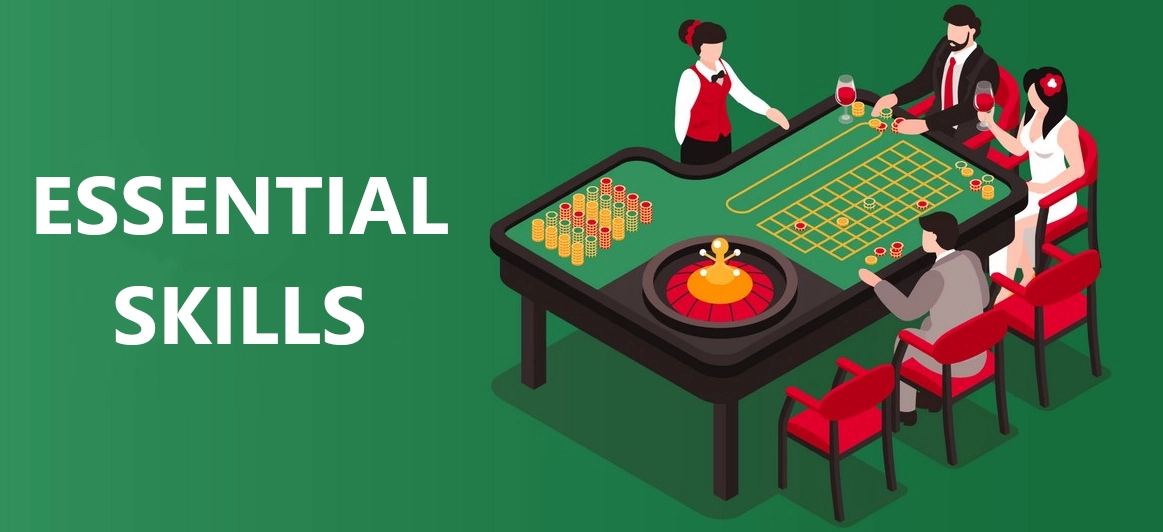
How to Become a Casino Dealer: Complete Step-by-Step Guide
🗝️ Key Takeaways
- Becoming a casino dealer in the United States means learning the rules for popular games like blackjack and poker, maintaining fairness, and ensuring a great guest experience.
- Keeping track of bets and pay-outs requires strong math skills and quick hands. It’s not just presentation—excellent communication is essential to interact with players on a crowded casino floor.
- For starters, almost all casinos need you to undergo a certified dealer training program and pass an audition. Then you need to get your dealer license from the state.
- Flexibility is essential because casino dealers usually work evenings, weekends, and holidays in a fast-paced, exciting environment serving various customers.
- The ability to work under pressure and settle disagreements peacefully will make you stand out. Building rapport with players will yield higher tips and faster career advancement!
- You can enter your next big opportunity by pursuing additional education and expanding your professional network. Learn about advancing into positions such as pit boss or casino management!
In order to be a casino dealer in the United States, you need to be at least 21 years old. Other requirements include having a high school diploma or GED and passing a background check. Almost every casino offers dealer schools or training programs.
These programs provide foundational knowledge of popular table games such as blackjack, poker, and roulette. Other states, including Nevada and New Jersey, require applicants to obtain a gaming license before beginning employment. Solid arithmetic aptitude, great people skills, and a willingness to work late hours are the keys to success in this position.
In addition to land casinos, dealers have opportunities in card rooms and cruise ships. As you can see, steps will vary somewhat depending on the state or casino, so it’s worth looking into local regulations. In the following sections, we’ll walk through each step in detail.
🎲 What Does a Casino Dealer Do?
A casino dealer’s job involves far more than simply dealing cards or spinning a roulette wheel. This position is at the center of the casino gaming experience. It touches on all of the duties that go into making sure the game stays exciting and equitable for all!
For example, dealers must understand the dealer and player rules and procedures for games such as poker, blackjack, roulette, etc. Every game is different, with varying regulations and tempo. Dealers get trained to make the transition from game to play seamlessly! That skill set ensures every table runs how it should, even on the busiest Friday nights.
♠️ More Than Just Dealing Cards
Dealers create a great atmosphere at the table. So, they talk to players, greet them, respond to their questions, and help maintain the positive environment. Excellent customer service skills are key — they ensure guests feel valued and welcomed from the first bet to the last.
Correctly processing bets and payouts is another major responsibility. So if someone wins at blackjack, the dealer has to pay out the winning chips. In the case of a disagreement, the dealer clarifies the house rules and verifies bets for proper play. In this manner, players on every side feel the game is fair.
📋 Your Daily Job Responsibilities
Each shift, dealers handle and deal cards at a fast clip. They ensure that chips are awarded to the correct players, and they record the players’ wins and losses.
The ability to think on your feet when problems arise is crucial. They talk with pit bosses or other staff to resolve issues quickly. From start to finish, the dealer plays a total role in keeping the experience smooth and enjoyable.
🎰 The Casino Work Environment
Casinos are filled with excitement. This is where dealers work closely with other staff members to maintain a smooth-running floor.
Maintaining professionalism is important, especially in situations where the stakes are high or the players are unruly. Strong teamwork and concentration allow dealers to stay in control of the action, ensuring a fun, fast pace, and fair play for everyone. The job is in high demand and requires the ability to stay cool under pressure.
🎯 Essential Skills for Success
Casino dealers operate in a fast-paced, high-stakes environment where accuracy and attention to detail are crucial skills for successful table game dealers. The job requires much more than a passion for games - it involves intense training to develop proper table game dealer skills.
Here, all the stops have implications, enhancing the experience for players who are willing to ante up.

⚙️ Master the Technical Abilities
Understanding how to run poker games is essential. Dealers must know the guidelines to run classics such as blackjack, roulette, and poker. Every game has its unique rules and path to victory.
Strong math skills are key for dealers to calculate payouts and bets quickly. Calculators aren’t allowed. Handling chips and cards takes steady hands and sharp eyes. Dealers must possess refined hand-eye coordination to maintain a fast pace of play.
Casino tech never stops evolving. Master the technical abilities. Understanding shufflers, card shoes, and tracking systems goes a long way in maintaining that flow.
Strong memory skills go a long way in following bets, rules, and player movements. Many start their journey by taking dealer classes, which build the foundation of knowledge and technique necessary to succeed on the casino floor.
👥 Develop Strong People Skills
As dealers interact with people from every walk of life, they learn to be nonjudgmental, which is necessary for successful table game dealer skills. The great ones understand the importance of making players feel welcome and warming them up, which can significantly enhance the gaming experience.
A sincere smile and kind word can go a long way in making guests feel at ease. Every now and then, players may start to get angry or raucous.
Your patience and calm demeanor ensure that the classroom remains a relaxed place. When disaster strikes, a calm temperament will correct issues before they escalate, showcasing the importance of proper dealing skills.
Dealers who are good listeners and clear communicators establish rapport with their players and fellow coworkers, which is key for maintaining a positive environment in the casino. This ability fosters good relationships and enhances the overall gaming experience for everyone involved.
Providing excellent customer service skills helps ensure that guests keep coming back, night after night.
🔥 Cultivate Mental Toughness
Games are quick. Dealers require mental acuity for grueling hours. Focus ensures errors are detected and promotes a level playing field. Dealing with stress is an occupational hazard, especially when working the front line in busy peak periods.
Dealers have to make difficult decisions, and players argue over the rules. Dealers can maintain professionalism and build mental resilience by attributing decisions to the rules rather than making them personal.
💫 Why Personality Trumps Perfection
You’d be surprised how far a positive demeanor can take you in the dealer school program. Players will always return to table games dealers who know how to put on a show.
While dealing skills are important, a warm smile and good humor can turn first-timers into regulars.
Even the best need time to rest, recharge, and stay sharp. Dealers who know how to balance work and well-being bring their best selves to every shift, which shows at the table.
🎓 Getting Qualified: Your Path to Dealing
Becoming a casino dealer in the United States isn’t as simple as shuffling cards and dealing out the chips. You have to follow very rigorous guidelines.
You’ll get practical, on-the-job training and prove that you can handle the speed and pressure of the casino floor. Training generally lasts approximately four to six weeks.
Some programs can take longer if you want to learn more games or attend a more immersive school. Nearly all new table games dealer candidates start their employment at a gaming school or through an on-the-job training program.
They learn everything from advanced game strategies to professional guest service techniques. The job requires a very high level of mental focus.
Dealers are on their feet for long shifts, operating tables where hundreds of players demand speedy hands, detailed instruction, and crisp calls.
1. Meet Basic Legal Requirements
You must be 18 years or older. Additionally, most casinos and training programs conduct background checks as well. Having any felony or even misdemeanor theft charge can derail your candidacy.
As state rules constantly evolve, consult your local state gaming commission for information related to licensing and table games dealer eligibility.
2. Find Your Ideal Dealer School
Choose an established dealer school with an excellent track record and instructors with actual casino experience. Look for schools that provide hands-on practice, focus on payout accuracy, and provide assistance with job placement.
Compare programs—some offer just blackjack, while some instruct on various games.
3. Learn Core Casino Game Rules
Learn blackjack and poker first. Understand how bets are made, how to pay out winnings, what players commonly do at the table, and all related details.
The more you know beyond the two assigned, the more hireable you become. Prior experience with diverse games can also give you an edge during auditions and interviews.
4. Practice Until It's Second Nature
Try practicing round robin tables and scrimmages. In fact, most schools allow you to practice in a live casino environment.
Receive feedback from your instructors to help you continue to hone your skills and ensure your instruction is up to the industry standard.
5. Pass Auditions and Get Licensed
Auditions are the final step. This is where you demonstrate your mad skills to the casino’s top managers.
If you succeed, the next step is to apply for a dealer license with your state, a job requirement in most casino jurisdictions.
📝 Required Skills and Qualifications
To be a casino dealer in the United States, you must have good people skills and technical know-how. Finally, you have to meet certain legal requirements.
📚 Education Requirements
Generally, the minimum education requirement for casinos is a high school diploma or GED. Many new dealers go through a dealer's school.
There, they’ll spend a few weeks learning the basics — how to shuffle cards, handle chips, and master game rules for blackjack, roulette, poker, or baccarat.
Many of the schools listed help place their graduates into employment opportunities, especially in competitive markets.
Especially if you’re dealing cards, people skills are key. Dealers spend several hours engaged with the guests at their table and must be able to focus on making the game experience flow seamlessly.
Being courteous, patient, and able to defuse high-stress situations goes a long way. An excellent dealer remains cool under pressure when people lose and is impartial to every player.
Good math skills are essential. Dealers need to be able to quickly do mental math to add up bets, handle payouts, and identify errors.
All states except Delaware and Mississippi require dealers to obtain a dealer gaming license. This involves completing a background check and in some cases a non-refundable fee.
Every state has different requirements, but generally speaking, most states want to ensure you do not have a shady past.
💪 Physical Stamina
You may be on your feet for eight-hour shifts or longer. During those shifts, you will be standing or making specific chip and card movements most of the time.
Excellent vision and hand-eye coordination are additionally beneficial, as you must be able to identify minute details and move cards quickly.
❓ Common Interview Questions
Casino dealer interviews in the United States usually want to verify ability and suitability. Hiring managers are going to want to know how well you know casino games.

Questions such as, “How would you describe the rules to someone who has never played blackjack before?” Here’s what they’re really looking for. They want to see if you understand fundamental concepts and can articulate them clearly.
Depending on the role, they may even have you demonstrate walking through a hand or how you would handle a payout. Prepare yourself—you’ll need specific examples for games such as roulette or craps—not just blackjack or poker.
Dealers are dealing with cash, chips, and people all day long. That means you should expect questions related to guest service and conflict resolution.
For instance, “How would you handle an angry customer?” or “What action would you take if you noticed someone cheating?”
They want to hear that you can keep your cool, be impartial, and adhere to the casino’s policy. They want to see that you have the ability to identify a problem before it escalates.
Telling an anecdote from previous employment—perhaps when you turned an angry customer around—will illustrate that you know how to handle the soft skills.
Math is something that arises all the time. Look out for rapid-fire math tests, such as counting chips or paying out a win. Or “When a player bets $10 on blackjack and wins what is the payout”?
Quick, accurate responses help to establish credibility. Occasionally, they throw in a math test or have you demonstrate chip handling on the spot.
Finally, be prepared for questions regarding your availability, ability to work with a team, and work ethic. Being adaptable is important because casinos operate 24 hours a day.
Transparent, truthful responses ensure both parties are on the same page with expectations.
📋 Hiring Process for Dealers
It’s a multi-step hiring process. The process starts with meeting basic requirements, like being at least 21 years old and having a high school diploma or GED.
Most casinos in locations such as Las Vegas or Atlantic City require candidates to complete a dealer school.
This training helps you demonstrate that you understand the guidelines and protocols for games like blackjack, poker, roulette, etc. Some locations even operate their in-house schools, where you can learn the dealer’s trade right on the property.
Once you complete your training, the real fun begins – applying! Nearly all casinos require you to submit an online application along with a resume detailing your previous background in customer service or handling cash.
They seek people who can keep cool and maintain the situation while developing rapport with players. If your application meets their needs, the casino will invite you for an audition.
This is where you really test out your talents—dealing live at a live table, sometimes with real chips and cards!
Managers look for a steady hand, clear speech, attention to detail, and a friendly disposition.
Even when you make it through the audition, that’s just the beginning. Then the casino proceeds with a background check where they’ll check your record for cleanliness because you will be dealing with money and trust is absolutely essential.
Other locations may conduct a drug test. Once cleared, you’ll receive a probationary position in which you’ll deal games on the floor under observation.
Constructive criticism is the game's name, and consistently strong performance will land you a full-time table games dealer position. In those larger markets, expect to begin on part-time or swing shifts, adding hours and days as you establish your seniority.
🏆 Training and Certification Options
Here’s how to become a casino dealer in the United States. This journey involves a mix of classroom instruction, hands-on practical training, and fulfilling state legal requirements.
Nearly everyone takes dealer school to get started. These institutions are typically community college or private vocational and technical schools.
They do very well in towns with a major gaming market such as Las Vegas or Atlantic City. Each program will primarily train dealers in card games such as blackjack, poker, and baccarat, but most programs will teach students the art of roulette and craps.
Classes teach you how to manage chips, shuffle cards, adhere to game rules, and identify cheating. Training usually takes from three weeks to six months. It just comes down to how many games you want to learn!
In addition to teaching the games, dealer schools strongly emphasize customer service and effective communication. Since dealers will be interacting with guests during their entire shift, excellent customer service skills are equally important.
Training typically employs simulated casino environments, allowing students to work with actual tables and chips. This immersive, hands-on format will enable beginners to acclimate to the quick pace and high level of precision required on the busy casino floor.
Once you’ve completed dealer school, certification is your next step. All states require dealers to be licensed by the state gaming commission.
Obtaining a dealer’s license typically requires a criminal background check and, in certain cases, a drug screening as well. Many casinos will require dealers to either pass a math exam or provide evidence of training completed.
In larger casino markets, employers work closely with local schools, which helps new graduates connect with available job openings. Since rules vary by state, it’s always a good idea to look at your state’s laws before you get started.
🧭 Navigating the Hiring Process
Luck Be a Dealer: Getting hired as a casino dealer in the U.S. takes more than good fortune. Candidates will need to relate their skills to the needs of casinos. Lastly, they have to show that they can work in the sometimes chaotic speed and show that they love customer service!
Casinos look for people who understand the games but want strong communicators who can keep guests happy and the tables running smoothly. Providing candidates with a crystal clear understanding of what to expect at each step puts the best candidates at a distinct advantage.

📝 Craft Your Casino Resume
A crafted resume is your best chance to stand out. Highlight transferable skills. Customer service experience, like that gained in retail or hospitality positions, highlights your people skills and poise when things get heated.
If you do have gaming experience, even from a smaller venue, include that first. Include skills such as fast math, articulate verbal communication, and multitasking. Make it easy on the eyes and keep your resume concise—one page is preferable.
Add only what’s relevant for dealer positions. This will help you keep your application as on-point and readable as possible.
🎬 Prepare for the Audition
Ultimately, a lot of the larger casinos are going to want to see your skills in an audition setting. To combat that, practice shuffling, dealing, and handling chips with friends or family.
Brush up on rules for casino table games, such as blackjack or poker, before your audition. Plan to arrive half an hour beforehand to demonstrate that you are dependable.
This step demonstrates that you can do the day-to-day work and maintain your cool behind the scenes and on stage.
🎯 Ace Your Casino Interview
So dress to impress and walk in there like you own the place. Prepare to talk about why you want to work in a casino! Provide examples of how you’ve gone above and beyond to provide excellent service.
Be ready for typical questions such as, “What is your five-year plan?” Prepare for questions like, “Tell us about a time you learned an important lesson in customer service.
These are your opportunities to prepare answers that impress with clear, logical thinking and genuine enthusiasm for the job.
🕵️ Understand Background Check Procedures
Nearly all casinos conduct extended background checks. If you do have tickets or a record, be forthright. Integrity is key.
Having a clean record makes the hiring process much quicker, but if they ask if you have a criminal history in an interview, be honest.
🎰 Life on the Casino Floor
Living and working as a dealer in the casino, you’ll experience the thrill of an exciting, energetic environment each day. The casino floor is loud, everything from the sound of slot machines clicking to chips racking up.
Dealers deal directly with the public—everyone from tourists on their first visit to business people on regular trips.
Though it's difficult, it’s a great environment for developing excellent customer service skills. You work with winners on top of the world, and players of bad luck as well. In a matter of hours, you can witness the best and worst in humanity.
🕒 Typical Shifts and Hours
Dealers frequently work long, flexible shifts, usually up to 10 hours, including late nights, weekends, and holidays. Casinos in urban centers like Las Vegas or Atlantic City never close.
Your shifts will vary based on guest traffic and significant events! A casino dealer typically will stand most of their shift, deal cards, spin roulette wheels, and rake chips.
Because all the lights and noise and all the commotion really do drain you by the end of the night. It’s important to know the games, but physical and mental stamina also play a significant role.
🌟 Handling Tough Situations Gracefully
A big part of the job is dealing with ugly situations beautifully. Players can become quite angry, and they tend to be more upset when there’s money at stake. Dealers must be the judges in disputes and often have to defuse angry patrons or agitated tables.
People do get overly intoxicated or start throwing fits when they lose. The best dealers create a sense of control by using quiet voices and precise language to maintain a quick pace.
Most people quickly pick up conflict resolution because every shift presents new strangers and trials.
⚖️ The Real Perks and Challenges
This job has thrill, a great crew, and apparently great tips – sometimes an additional $600 per month. The grueling hours, high pressure, and expectation to always be runway-ready make it a lifestyle that’s not for everyone.
Dealers develop a thick skin and learn to keep positive, day in and day out.
🚀 Beyond Dealing: Casino Career Growth
The path of a casino dealer doesn’t stop on the gaming floor. The casino industry offers many ways to develop a fulfilling, lifelong career! You can either make a selected leap into leadership or have a broader movement through the different roles.
Dealers certified in several games, like blackjack and roulette, are able to take on additional shifts. They do much better in the applicant pool for special tables! Others will focus on a single game as they work their way up, a process which creates the opportunity for higher-paid positions to be unlocked.
🪜 Moving Up the Ladder
Advancement in a casino isn’t just moving up one’s department. It’s learning different skills. Dealers can enroll in continuing education classes or complete industry certifications to advance their skills.
Making sure your supervisors are aware of your desire to move up into leadership positions, such as pit boss or floor manager, is a great start. Volunteering for additional duties, like assisting in training new dealers or conducting staff tournaments, demonstrates initiative and dedication.
A dealer can promote up to an inspector in under five years at many casinos, assuming they exhibit exceptional talent.
🎲 Exploring Different Casino Roles
Growth Opportunities for Dealers should not just focus on the casino tables for career advancement. Whether it’s a role in surveillance, customer service, or managing live dealer games over the Internet, those roles are fairly standard trajectories.
Skills learned on the casino floor—how to do math quickly or read people—usually translate easily to other fields. Many experienced dealers move on to casino management positions or guest services.
💡 Continuous Learning Opportunities
Casinos routinely host workshops on new games or technology. Dealers who are always in the know are always going to be ahead. Networking events provide an opportunity for you to engage with your fellow industry professionals and get the jump on new positions opening up.
A positive job outlook for casino dealers. Wages from $12-$28/hour result in salaries of $30,000-$60,000 annually or higher. Tips and seasonal demand play a big role in total earnings as well.
🌍 Regional Regulations and Practices
Regulations governing casino dealers vary widely by state and locality. In the U.S., it’s up to state gaming boards to determine the standard for who is allowed to deal cards.
As seen in states such as Nevada and New Jersey, licensing procedures can be onerous. This is particularly acute for dealers, who generally have to be 21, of good character and repute, and pass criminal background checks.
If you want to work in Las Vegas, you must get a work permit through the county. Training rules can vary significantly from one jurisdiction to another.
Large casino markets require certification from a dealer school, but in smaller locales, you can learn on the job. For instance, in California tribal casinos, you may only need to take and pass an in-house exam.
There’s the matter of local gaming rules that dealers must be familiar with. Every state determines its own game legality, bet limits, and policies around dealing tips.
For example, Colorado casinos only allow bets up to a certain amount, and in Atlantic City, games have a local flavor. Working conditions are subject to shift as well. While casinos in larger, tourist-friendly cities operate around the clock, in some smaller jurisdictions, casinos might shut down after dark.
Becoming certified is the next part of the puzzle. A few states require a gaming license as well, which entails fingerprinting and drug screening.
In other places, a basic criminal history check would suffice. Passing the first time is not enough—keeping your license depends on continued success.
Dealers have to work within the confines of the rules, not get caught up in scandals, and in some cases, undergo additional training when regulations shift.
We know these steps can be intimidating, but they are designed to protect the magic of the casino world for all guests!
🔍 Working Conditions Overview
Casino dealers in the United States usually work in bustling, exciting rooms. These environments are high-energy, loud, with the sounds of chips and cards, often brightly lit and open 24/7 in all but the largest casino markets.
Dealers work in shifts, which often means nights, weekends, and holidays. This shift pattern isn’t unusual in places such as Las Vegas or Atlantic City, where casino doors are open 24/7.
While some dealers can secure consistent daytime shifts at smaller tribal or local casinos, the majority need to remain adaptable.
The uniform/dress code is well-defined and professional. Dealers are required to wear uniforms, typically a dealer’s uniform vest with a jacket and a name tag.
This means good hygiene is required. Most casinos do look for clean hands and short fingernails, as dealers will be handling chips and cards in front of guests.
The work is entirely performed while on your feet, frequently in a standing position for long periods of time, sometimes eight hours or longer. Breaks are determined by the casino, with breaks scheduled every hour or so.
The job is tough on your legs and feet.
So, like professional athletes, dealers must maintain a razor’s edge. They need to be familiar with game rules, the ability to identify cheating, as well as properly manage money.
Above all, math skills are essential, as dealers are required to count quickly and pay winning bets instantaneously. With most casinos operating 24/7 surveillance from above, a dealer’s every action is monitored to ensure fair play and high skill.
Although working with guests can be exciting and enjoyable, it comes with stressful situations.
Some players are pleasant, while others take the loss hard, becoming angry or loud. Dealers become people whisperers on the job, allowing them to cater to every kind of mood.
🔒 Conclusion
The first step is to understand the fundamentals. Next, learn the necessary skills and approach a nearby casino.
U.S. Dealers usually have a wide variety of backgrounds. Some had grown up in the shadows of major gaming jurisdictions like Las Vegas or Atlantic City.
Some people take a more modest path by beginning their dealer careers at nearby card rooms or tribal casinos. Some go through dealer school to have their foot in the door, and others learn on the job.
Quick wins, interesting people, and energetic environments, dealers experience it all. Want to learn more about getting involved?
Visit local dealer schools or speak with someone currently dealing on the floor. You’ll be sitting down to a card table before you know it.
Frequently Asked Questions❓
What qualifications do you need to become a casino dealer in the U.S.?
To work at a casino, you’ll most likely need at least a high school diploma or GED and be at least 21 years old. Furthermore, you are required to successfully complete a background check and potentially obtain gaming licenses issued by the state of employment, which varies by casino and location.
Do you need prior experience to work as a casino dealer?
Not necessarily. Many casinos provide in-house training or partner with certified dealer schools to prepare new hires.
Completing a blackjack or poker dealer program not only helps you master the basics but also significantly enhances your likelihood of securing employment. These programs focus on key areas like guest service, handling payouts, and understanding table games in detail, making them valuable even if you have no prior experience.
How long does casino dealer training take?
Training usually lasts between four and six weeks, based on how intricate the games being explained are. For table games like poker or craps, the program may take even longer due to the added rules and procedures.
Throughout the course, you'll focus on mastering game mechanics, learning how to handle payouts accurately, and sharpening your guest service and communication skills—essential traits for any successful table games dealer.
Are casino dealer jobs available in Los Angeles?
Yes, casino dealer jobs remain in high demand across Los Angeles. Many casinos hire year-round, particularly those seeking fresh talent from reputable dealer schools.
Completing a training program not only boosts your employment prospects but also ensures you meet the essential attributes required by state licensing criteria—a key factor in getting hired and starting your career on the casino floor.
What skills make a great casino dealer?
Quick math skills, great customer service, and a detail-oriented demeanor are all big ones for successful table games dealers. They need to think on their feet, work under pressure, and demonstrate proper dealing skills with cash and chips.
What is the hourly pay for a casino dealer?
Compensation for dealers varies, but in Los Angeles, the majority of dealers earn $15 to $25 an hour before tips, which can significantly enhance overall income for successful table games dealer students.
Can casino dealers advance to other roles?
Yes, dealers can advance to become supervisors, pit bosses, or managers. With intense training and a track record of excellence, they can unlock paths to more lucrative job opportunities within the casino business.





























